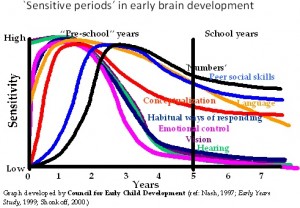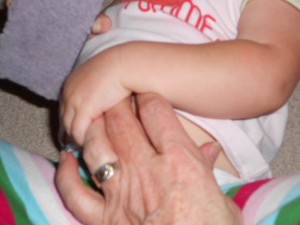When we think of kindergarten readiness, all too often academics is the first thing that comes to mind. But emotions is also an important part of children’s early learning. In fact, the brain is most sensitive to the development of emotional control about the age of one year old. For more impact, check out this graph by the Council for Early Child Development.

 Hands can give tickles. Sharing a tickle with a little one can be a fun part of learning about emotions and relationships. Tickles involve an element of trust. As adults, we carefully scan children’s faces for signs that the tickling is enjoyable, stopping long before a child is uncomfortable or overstimulated. We are careful not to jeopardize the give-and-take interaction. Children learn from our example and reactions.
Hands can give tickles. Sharing a tickle with a little one can be a fun part of learning about emotions and relationships. Tickles involve an element of trust. As adults, we carefully scan children’s faces for signs that the tickling is enjoyable, stopping long before a child is uncomfortable or overstimulated. We are careful not to jeopardize the give-and-take interaction. Children learn from our example and reactions.
Touching is a powerful and natural tool for healthy development. The skin isn’t the only part of the body that needs touch, so does the brain for all kinds of connections. A tickle may only be for a few seconds, but the laughing and connecting can feel good for a long time. Does this idea tickle your fancy?
